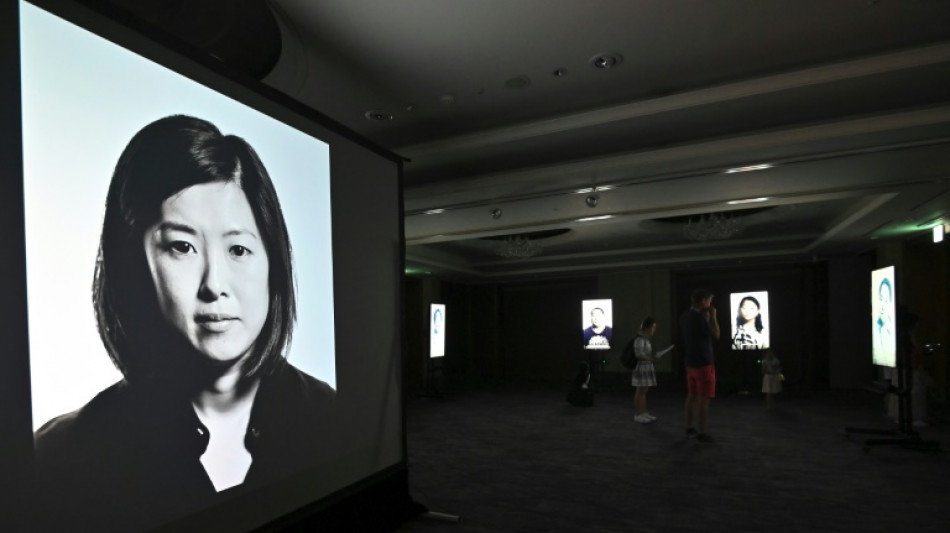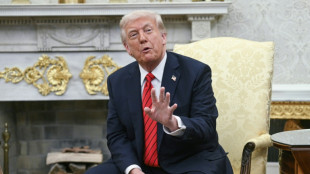
-
 Maresca leaves celebrations to players after Chelsea sink Fulham
Maresca leaves celebrations to players after Chelsea sink Fulham
-
Trump eyes gutting US diplomacy in Africa, cutting soft power: draft plan

-
 Turkey bans elective C-sections at private medical centres
Turkey bans elective C-sections at private medical centres
-
Lebanon army says 3 troops killed in munitions blast in south

-
 N.America moviegoers embrace 'Sinners' on Easter weekend
N.America moviegoers embrace 'Sinners' on Easter weekend
-
Man Utd 'lack a lot' admits Amorim after Wolves loss

-
 Arteta hopes Arsenal star Saka will be fit to face PSG
Arteta hopes Arsenal star Saka will be fit to face PSG
-
Ukrainian troops celebrate Easter as blasts punctuate Putin's truce

-
 Rune defeats Alcaraz to win Barcelona Open
Rune defeats Alcaraz to win Barcelona Open
-
Outsider Skjelmose in Amstel Gold heist ahead of Pogacar and Evenepoel

-
 Arsenal make Liverpool wait for title party, Chelsea beat Fulham
Arsenal make Liverpool wait for title party, Chelsea beat Fulham
-
Trump slams 'weak' judges as deportation row intensifies

-
 Arsenal stroll makes Liverpool wait for title as Ipswich face relegation
Arsenal stroll makes Liverpool wait for title as Ipswich face relegation
-
Sabalenka to face Ostapenko in Stuttgart final

-
 Kohli, Padikkal guide Bengaluru to revenge win over Punjab
Kohli, Padikkal guide Bengaluru to revenge win over Punjab
-
US aid cuts strain response to health crises worldwide: WHO

-
 Birthday boy Zverev roars back to form with Munich win
Birthday boy Zverev roars back to form with Munich win
-
Ostapenko eases past Alexandrova into Stuttgart final

-
 Zimbabwe on top in first Test after Bangladesh out for 191
Zimbabwe on top in first Test after Bangladesh out for 191
-
De Bruyne 'surprised' over Man City exit

-
 Frail Pope Francis takes to popemobile to greet Easter crowd
Frail Pope Francis takes to popemobile to greet Easter crowd
-
Lewandowski injury confirmed in blow to Barca quadruple bid

-
 Russia and Ukraine accuse each other of breaching Easter truce
Russia and Ukraine accuse each other of breaching Easter truce
-
Zimbabwe bowl Bangladesh out for 191 in first Test in Sylhet

-
 Ukrainians voice scepticism on Easter truce
Ukrainians voice scepticism on Easter truce
-
Pope wishes 'Happy Easter' to faithful in appearance at St Peter's Square

-
 Sri Lanka police probe photo of Buddha tooth relic
Sri Lanka police probe photo of Buddha tooth relic
-
Home hero Wu wows Shanghai crowds by charging to China Open win

-
 Less Soviet, more inspiring: Kyrgyzstan seeks new anthem
Less Soviet, more inspiring: Kyrgyzstan seeks new anthem
-
Defending champion Kyren Wilson crashes out in first round of World Snooker Championship

-
 NASA's oldest active astronaut returns to Earth on 70th birthday
NASA's oldest active astronaut returns to Earth on 70th birthday
-
Exec linked to Bangkok building collapse arrested

-
 Zelensky says Russian attacks ongoing despite Putin's Easter truce
Zelensky says Russian attacks ongoing despite Putin's Easter truce
-
Vaibhav Suryavanshi: the 14-year-old whose IPL dream came true

-
 Six drowning deaths as huge waves hit Australian coast
Six drowning deaths as huge waves hit Australian coast
-
Ukrainian soldiers' lovers kept waiting as war drags on

-
 T'Wolves dominate Lakers, Nuggets edge Clippers as NBA playoffs start
T'Wolves dominate Lakers, Nuggets edge Clippers as NBA playoffs start
-
Taxes on super rich and tech giants stall under Trump

-
 Star Wars series 'Andor' back for final season
Star Wars series 'Andor' back for final season
-
Neighbours improvise first aid for wounded in besieged Sudan city

-
 Tariffs could lift Boeing and Airbus plane prices even higher
Tariffs could lift Boeing and Airbus plane prices even higher
-
Analysts warn US could be handing chip market to China

-
 Unbeaten Miami edge Columbus in front of big MLS crowd in Cleveland
Unbeaten Miami edge Columbus in front of big MLS crowd in Cleveland
-
Social media helps fuel growing 'sex tourism' in Japan

-
 'Pandora's box': alarm bells in Indonesia over rising military role
'Pandora's box': alarm bells in Indonesia over rising military role
-
Alaalatoa hails 'hustling hard' Brumbies for rare Super Rugby clean sheet

-
 Trio share lead at tight LA Championship
Trio share lead at tight LA Championship
-
Sampdoria fighting relegation disaster as old heroes ride into town

-
 Recovering pope expected to delight crowds at Easter Sunday mass
Recovering pope expected to delight crowds at Easter Sunday mass
-
Nuggets edge Clippers in NBA playoff overtime thriller, Knicks and Pacers win


S. Korea govt responsible for international adoption fraud: inquiry
A South Korean official enquiry said Wednesday the government was responsible for abuse in international adoptions of local children, including record fabrication and inadequate consent, and recommended an official state apology.
"It was determined that the state neglected its duty ... resulting in the violation of the human rights of adoptees protected by the constitution and international agreements during the process of sending a lot of children abroad," South Korea's Truth and Reconciliation Commission said in a statement.
The country -- now Asia's fourth biggest economy and a global culture powerhouse -- remains one of the biggest ever exporters of babies in the world, having sent more than 140,000 children overseas between 1955 and 1999.
International adoption began after the Korean War as a way to remove mixed-race children, born to local mothers and American GI fathers, from a country that emphasised ethnic homogeneity.
It became big business in the 1970s to 1980s, bringing international adoption agencies millions of dollars as the country overcame post-war poverty and faced rapid and aggressive economic development.
More recently, the main driver has been babies born to unmarried women, who still face ostracism in a patriarchal society, and according to academics, are often forced to give up their children.
In a landmark announcement, the country's truth commission concluded after a two-year and seven-month investigation that human rights violations occurred in international adoptions of South Korean children, including "fraudulent orphan registrations, identity tampering, and inadequate vetting of adoptive parents".
It also said "numerous cases were identified where proper legal consent procedures" for South Korean birth parents were "not followed".
The commission also said the South Korean government failed to regulate adoption fees, allowing agencies to set them through "internal agreements", effectively turning it into a profit-driven industry.
And despite regulations requiring verification of adoptive parents' eligibility, an overwhelming majority -- 99 percent -- of intercountry adoption approvals in 1984 alone were granted on the same day or the following day, the commission said, citing its investigation.
"These violations should never have occurred," the commission's chairperson Park Sun-young told reporters.
"This is a shameful part of our history," she added.
- 'Eternal uncertainty' -
For years, Korean adoptees have advocated for their rights, many reporting that their birth mothers were forced to give up their children, leading to the fabrication of records to make them legally adoptable.
Some South Korean birth parents and adoptees even claimed that their children were kidnapped -- by agents who sought out unattended children in poor neighbourhoods -- or that authorities directed lost children towards adoption without trying to reunite them with their families, in some cases intentionally changing the child's identity.
Some adoptees -- such as Adam Crapser -- were deported to South Korea as adults because their American parents never secured their US citizenship.
The commission confirmed human rights violations in only 56 out of 367 complaints, saying there was an overwhelming amount of data to try to verify, and said it would "make efforts" to review the remaining cases before its investigation expires on May 26.
Some adoptees were dissatisfied with this outcome, urging the commission to fully recognise violations in all 367 cases.
"Without the truth, our lives rests upon guesses, estimations and creative narratives," Boonyoung Han, a Danish Korean adoptee, said in a statement.
"We are victims to state violence but without a trace! Literally. Destruction and withholding of our documents must not leave us open to eternal uncertainty."
Hanna Johansson, a Korean adoptee in Sweden, said she considers the commission's announcement a "victory" for her adoptee community regardless.
"I also hope that more and more South Korean (birth) parents who lost their child without their consent will come forward and demand justice," she told AFP.
A.Kunz--VB


